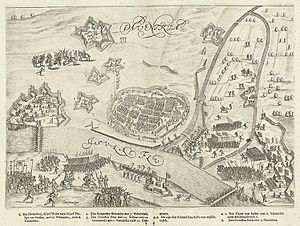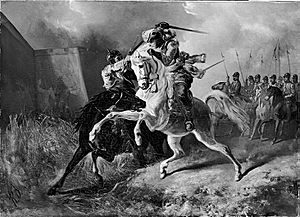Siege of Deventer (1591) facts for kids
Quick facts for kids Siege of Deventer (1591) |
|||||||
|---|---|---|---|---|---|---|---|
| Part of the Eighty Years' War | |||||||
 The siege of Deventer in 1591 – a print by Bartholomeus Dolendo |
|||||||
|
|||||||
| Belligerents | |||||||
| Commanders and leaders | |||||||
| Strength | |||||||
| 9,000 infantry 1,600 cavalry 28 guns |
1,200 | ||||||
| Casualties and losses | |||||||
| 200 | All surrendered | ||||||
The Siege of Deventer happened from June 1 to June 10, 1591. It was part of the Eighty Years' War. During a siege, an army surrounds a city to try and take control of it. In this event, Dutch and English soldiers worked together. Their goal was to take back the city of Deventer from the Spanish army. Prince Maurice of Nassau led the Dutch and English forces. The Spanish soldiers in Deventer were led by Herman van den Bergh. The siege ended with a victory for the Dutch and English.
Why Deventer Was Important
Deventer is a city in the Netherlands. It had been captured by Dutch forces in 1579. But then, the Spanish took it back. This happened because an English governor named William Stanley betrayed the city. He switched sides and helped the Spanish.
In 1591, Prince Maurice of Orange was leading his army. They had just captured another city called Zutphen on May 30. After that victory, Maurice and his army marched towards Deventer. Deventer was on the right side of the IJssel river.
Maurice's army was quite large. It had about 9,000 foot soldiers and 1,200 horse riders. Half of these soldiers came from the British Isles. There were fourteen English companies led by Sir Francis Vere. There were also ten Scots companies led by Colonel William Balfour.
The Siege Begins
On June 1, the Dutch and English army surrounded Deventer. They started digging trenches around the city. This helped them get closer and protect themselves.
Eight days later, the attackers made a large hole, called a breach, in the city's walls. Prince Maurice decided to let the English soldiers lead the attack through this hole.
As the English soldiers attacked, they tried to cross a bridge made of boats. But the bridge was too short. They could not reach the city walls and had to pull back. They lost some soldiers during this attempt.
Prince Maurice thought about giving up the siege. He was worried that a large Spanish army might come to help Deventer. But Sir Francis Vere convinced him to keep trying.
That same evening, the Spanish soldiers inside Deventer tried to attack the bridge. This kind of attack from a surrounded city is called a sortie. But the English soldiers, who used long spears called pikes, fought them off.
On June 10, the Spanish commander, Van den Bergh, was wounded. He realized that no help was coming for his soldiers. So, he and the city leaders decided to surrender. The Spanish soldiers marched out of Deventer the next day.
What Happened Next
For the English, taking back Zutphen and Deventer was very important. It helped them recover from the earlier losses. These losses happened because people like William Stanley and Rowland York had betrayed them.
After Deventer, Maurice wanted to attack Groningen. This city was held by a Spanish commander named Francisco Verdugo. But Maurice heard that the Duke of Parma was getting ready to send 20,000 soldiers to Groningen. Maurice knew his army would be outnumbered. So, he decided to move north instead. He marched to Delfzijl and captured that place on July 2.
Images for kids
See also
 In Spanish: Asedio de Deventer (1591) para niños
In Spanish: Asedio de Deventer (1591) para niños
 | Kyle Baker |
 | Joseph Yoakum |
 | Laura Wheeler Waring |
 | Henry Ossawa Tanner |




